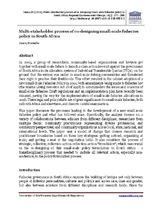Multi-stakeholder process of co-designing small-scale fisheries policy in South Africa.
Abstract
In 2005, a group of researchers, community-based organizations and lawyers got together with small-scale fishers to launch a class action law suit against the government of South Africa in its allocation system of Individual Transferable Quotas, on the ground that the system was unfair to small-scale fishing communities and threatened their right to practise their livelihoods. This effort resulted in the cabinet adoption of a new small-scale fisheries policy in 2014, with amendments being made to fisheries law (the Marine Living Resource Act 18 of 1998) to accommodate the issues and concerns of small-scale fisheries. Draft regulations and an implementation plan have recently been released, paving the way for the implementation of small-scale fisheries allocations in 2016. These legal and policy shifts are of great significance for small-scale fisheries, both in South Africa and elsewhere, and deserve careful examination. This paper discusses the processes leading to the development of a new small-scale fisheries policy and what has followed since. Specifically, the analysis focuses on a variety of collaborations between scholars from different disciplines; researchers from multiple fields; community practitioners representing diverse professional and community perspectives; and community organizations across local, state, national and international levels. The paper uses a model of change that crosses research and practitioner boundaries based on three key strategies: getting noticed; organizing at scale; and getting a seat at the negotiation table. It also considers the “transdisciplinary” process of involving all relevant actors in strategic, collective, reflection–action–reflection–action “from below”, which was crucial in the co-designing of this small-scale policy formulation in South Africa.

